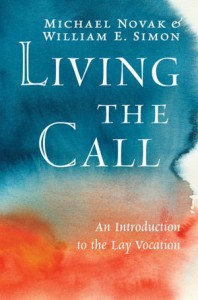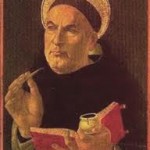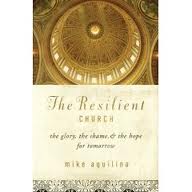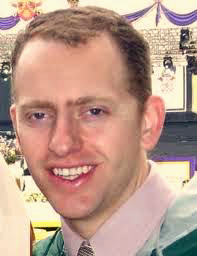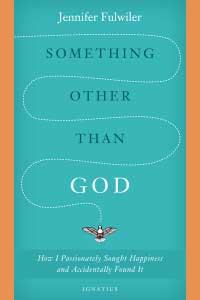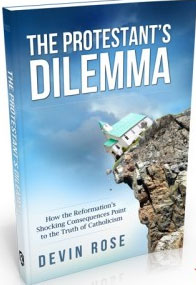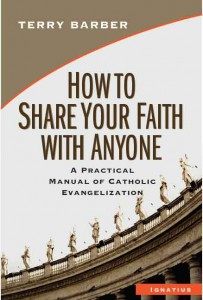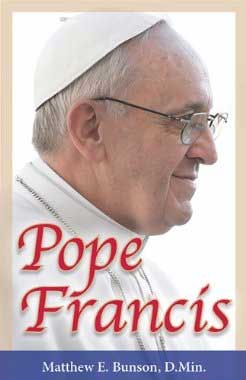Michael Novak is a shining witness of what occurs in the soul when the head makes the journey to the heart. 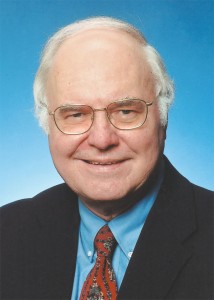  What a gift he is to all of us and what a profound sage of wisdom…when he so-gently speaks, I listen….we all should!  In “Living the Call: An Introduction to the Lay Vocation“, Michael, along with his co-author William E. Simon, Jr, establishes, in Part 1, of the book, the need for the lay vocation in the Church today.  They chronicle that need with a national and global perspective.  They also present how “living the call”  looks in the lives of nine committed  lay faithful working in parish life today.
 What a gift he is to all of us and what a profound sage of wisdom…when he so-gently speaks, I listen….we all should!  In “Living the Call: An Introduction to the Lay Vocation“, Michael, along with his co-author William E. Simon, Jr, establishes, in Part 1, of the book, the need for the lay vocation in the Church today.  They chronicle that need with a national and global perspective.  They also present how “living the call”  looks in the lives of nine committed  lay faithful working in parish life today.
Part 2 is worth it’s weight in gold! It outlines the absolute necessity of  growth in the interior life of the laity.  How essential it is to deepen the spiritual life .  They give voice to  the need to appreciate the desert experiences of our lives as an opportunities for greater unity with Christ; such periods provide the fonts of grace which nurtures the work in ministry.  For anyone  who severs in ministry of any kind, either as an employee or as a volunteer, if you pass this indispensable book by, you do so at your own peril!
[powerpress]
Michael Novak’s website can be found here
 You can find “Living the Call” here
“This is the book that countless Catholic laypeople have been waiting for as they ponder how to respond to Vatican II’s challenge to take more active roles in the life of the Church and to bring Christian principles to life in the secular world. It’s a gem of a book that speaks to laypeople in all walks of life and at all stages of their earthly journeys.â€
Mary Ann Glendon, Learned Hand Professor of Law, Harvard University
Tags: catholic, catholic podcast, catholic prayer, cathollc spirituality
This entry was posted on Sunday, August 3rd, 2014 at 7:29 am
You can follow any responses to this entry through the RSS 2.0 feed.
Episode 2- What is the relationship between religion and science?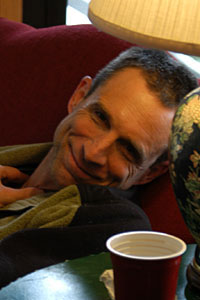
[powerpress]
Question 1 Article 2. Whether sacred doctrine is a science.
Objection 1:Â It seems that sacred doctrine is not a science. For every science proceeds from self-evident principles. But sacred doctrine proceeds from articles of faith which are not self-evident, since their truth is not admitted by all: “For all men have not faith” (2 Thess. 3:2). Therefore sacred doctrine is not a science.
Objection 2:Â Further, no science deals with individual facts. But this sacred science treats of individual facts, such as the deeds of Abraham, Isaac and Jacob and such like. Therefore sacred doctrine is not a science.
On the contrary, Augustine says (De Trin. xiv, 1) “to this science alone belongs that whereby saving faith is begotten, nourished, protected and strengthened.” But this can be said of no science except sacred doctrine. Therefore sacred doctrine is a science.
I answer that, Sacred doctrine is a science. We must bear in mind that there are two kinds of sciences. There are some which proceed from a principle known by the natural light of intelligence, such as arithmetic and geometry and the like. There are some which proceed from principles known by the light of a higher science: thus the science of perspective proceeds from principles established by geometry, and music from principles established by arithmetic. So it is that sacred doctrine is a science because it proceeds from principles established by the light of a higher science, namely, the science of God and the blessed. Hence, just as the musician accepts on authority the principles taught him by the mathematician, so sacred science is established on principles revealed by God.
Reply to Objection 1:Â The principles of any science are either in themselves self-evident, or reducible to the conclusions of a higher science; and such, as we have said, are the principles of sacred doctrine.
Reply to Objection 2:Â Individual facts are treated of in sacred doctrine, not because it is concerned with them principally, but they are introduced rather both as examples to be followed in our lives (as in moral sciences) and in order to establish the authority of those men through whom the divine revelation, on which this sacred scripture or doctrine is based, has come down to us.
For an online version of St. Thomas Aquinas’ “Summa” click here
“Christian Apologetics with Dr. R. R. Reno” explores numerous facets of faith and reason in the life of the Church and the world. Grounded on the work of giants, such as St. Thomas Aquinas, St. Bonaventure, Blessed John Newman, soon-to-be Blessed John Paul II, G. K. Chesterton, Blaise Paschal and Stephen Barr, Dr. Reno helps us to open our minds to make the journey to our hearts.
R. R. Reno is the editor at First Things: A Journal of Religion, Culture, and Public Life, and Professor of Theology, currently on leave from Creighton University. His theological work has been published in many academic journals. Essays and opinion pieces on religion, public life, contemporary culture, and current events have appeared in Commentary, and the Washington Post. In Fighting the Noonday Devil Reno suggests that putting ourselves at the disposal of what is real is what trains us for true piety. His other recent books include Genesis: Brazos Theological Commentary on the Bible and Sanctified Vision: An Introduction to Early Christian Interpretation of the Bible.
Tags: catholic, catholic podcast, catholic prayer, cathollc spirituality
This entry was posted on Friday, August 1st, 2014 at 8:40 am
You can follow any responses to this entry through the RSS 2.0 feed.
Episode 5– Light in the Dark Ages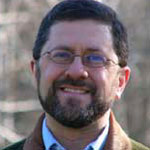
The Resilient Church with Mike Aquilina, offers a fascinating look at the trials and triumphs of the Catholic Church over the past two thousand years. Fast-paced sketches of critical periods in church history give readers perspective on the challenges faced by the church today. Mike Aquilina does not shrink from the realities of the past, including badly behaved leaders and those who betrayed the Lord. Yet he also leaves us all with well-founded hope for the future: God remains faithful in every circumstance and fulfills his promise to remain with his church always. Hosted by Kris McGregor
Also visit Mike’s “Discerning Hearts†page for more audio downloads and information!
Tags: catholic, catholic podcast, catholic prayer, cathollc spirituality
This entry was posted on Friday, August 1st, 2014 at 8:27 am
You can follow any responses to this entry through the RSS 2.0 feed.
Sacramentals
[powerpress]
In the minds of non-Catholics, Catholicism often conjures images of Catholic stuff: candles, crucifixes, rosaries, statues, holy water, oils,
and the like. These are called sacramentals—not to be confused with the seven sacraments, they are material items that the Lord uses as conduits of his blessing.
Because of our belief in sacramentals, Catholics have sometimes been accused of practicing magic. But magic is the pagan or new age belief that an object has power in and of itself. Sacramentals are the Christian belief that the living and true God uses His creation as instruments of grace and healing.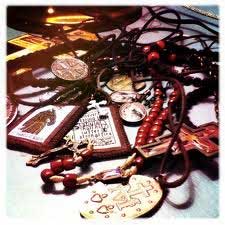
Sacramentals appear all throughout the Scriptures. James speaks of anointing with oil.1 Acts of the Apostles tells us that Paul’s handkerchiefs brought healing power to those they touched.2In the Old Testament, Elisha’s bones were used to bring a dead man back to life.3
And of course the Gospels portray Our Lord himself often using water, mud or even his own spit to perform mighty works of healing and cleansing, a power which Jesus passed on to his priests to be continued to this day.4Â Sacramentals are neither magic nor make believe, but powerful weapons to be utilized in our spiritual journeys.
1 -Â Js. 5:14
2 -Â Acts 19:11-12
3 -Â 2 Kgs. 13:21
4 -Â cf. Mt. 10:7-8; Lk. 10:18-20; Jn. 20:21-23, etc.
Tags: catholic, catholic apologetics, catholic podcast, catholic prayer, cathollc spirituality, sacramentals
This entry was posted on Monday, July 28th, 2014 at 11:56 am
You can follow any responses to this entry through the RSS 2.0 feed.
Episode 3 – The Case for Christianity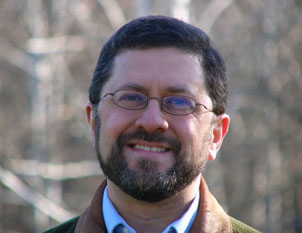
[powerpress]
The Resilient Church with Mike Aquilina, offers a fascinating look at the trials and triumphs of the Catholic Church over the past two thousand years. Fast-paced sketches of critical periods in church history give readers perspective on the challenges faced by the church today. Mike Aquilina does not shrink from the realities of the past, including badly behaved leaders and those who betrayed the Lord. Yet he also leaves us all with well-founded hope for the future: God remains faithful in every circumstance and fulfills his promise to remain with his church always.
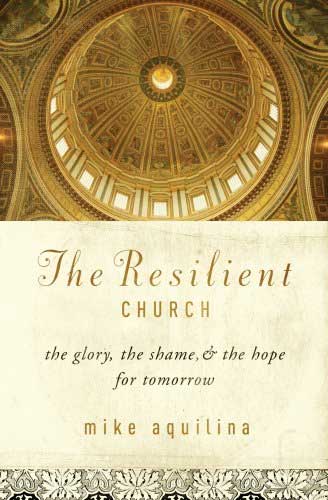 Pick up a copy of Mke’s book. You’ll find so much more and invaluable references and resoources, as well
Pick up a copy of Mke’s book. You’ll find so much more and invaluable references and resoources, as well
Also visit Mike’s “Discerning Hearts†page for more audio downloads and information!
Tags: catholic, catholic podcast, catholic prayer, cathollc spirituality
This entry was posted on Thursday, June 26th, 2014 at 10:47 am
You can follow any responses to this entry through the RSS 2.0 feed.
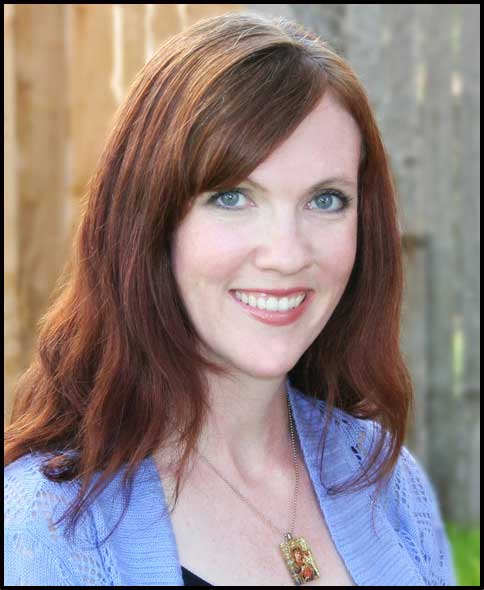 “Something Other Than God: How I Passionately Sought Happiness and Accidentally Found It” by Jennifer Fulwiler… what a phenomenal book. An engaging read, great topic, and an inspiring, joyful witness!  Leave it to the editor/author of one our favorite blogs “Conversion Diary“, to pen not only a great conversion story, but one of the most moving cases for Catholic faith out there. Her honesty and humor are refreshing.  You feel the struggle Jennifer experiences as she searches for answers.  Her quest leads her to a peace for which most of us yearn. Hats off to Ignatius Press for the production values on this  book of quality worthy of the story contained within it’s pages. This is a book you will pass on to others, so I would just suggest the purchase of multiple copies… it’s just that good!
“Something Other Than God: How I Passionately Sought Happiness and Accidentally Found It” by Jennifer Fulwiler… what a phenomenal book. An engaging read, great topic, and an inspiring, joyful witness!  Leave it to the editor/author of one our favorite blogs “Conversion Diary“, to pen not only a great conversion story, but one of the most moving cases for Catholic faith out there. Her honesty and humor are refreshing.  You feel the struggle Jennifer experiences as she searches for answers.  Her quest leads her to a peace for which most of us yearn. Hats off to Ignatius Press for the production values on this  book of quality worthy of the story contained within it’s pages. This is a book you will pass on to others, so I would just suggest the purchase of multiple copies… it’s just that good!
[powerpress]
You can find the book here
“This heartfelt book is a lovely account of a spiritual journey and a charming memoir. The author’s epiphanies are wonderfully conveyed and will resonate with readers.” —Dean Koontz, #1 New York Times Bestselling Author
“Thought-provoking, honest, and often hilarious. It will strike a chord with anyone who ever posed –or tried unsuccessfully to avoid– the big questions of life.” —Gretchen Rubin, New York Times bestselling author,The Happiness Project
Tags: catholic, catholic podcast, catholic prayer, cathollc spirituality, Jennifer Fulwiler
This entry was posted on Wednesday, June 18th, 2014 at 4:07 pm
You can follow any responses to this entry through the RSS 2.0 feed.
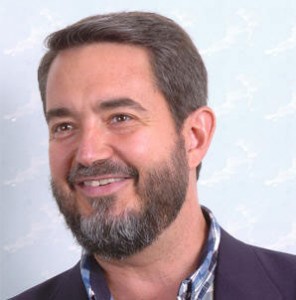 What a delight to once again speak with Dr. Scott Hahn, especially about his exceptionally important book  Evangelizing Catholics: A Mission Manual for the New Evangelization”. Who should have this book? Everyone!  Just the right mix for the adult Catholic to digest: part history book, part theology book, steeped in Scared Scripture, a sacramental feast,  anointed by the Holy Spirit…this work is just what the Church needs at this time.  If I had my way, every Catholic community would be passing out this book after mass even more eagerly than it does it’s parish bulletin! HIGHLY ENCOURAGED READING! [powerpress] Â
What a delight to once again speak with Dr. Scott Hahn, especially about his exceptionally important book  Evangelizing Catholics: A Mission Manual for the New Evangelization”. Who should have this book? Everyone!  Just the right mix for the adult Catholic to digest: part history book, part theology book, steeped in Scared Scripture, a sacramental feast,  anointed by the Holy Spirit…this work is just what the Church needs at this time.  If I had my way, every Catholic community would be passing out this book after mass even more eagerly than it does it’s parish bulletin! HIGHLY ENCOURAGED READING! [powerpress]  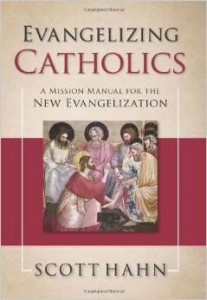 You can find the book here
You can find the book here
You can’t keep the faith unless you give it away. That’s a fact. To be a Christian is to be an evangelizer. When the Catholic Church calls us to a “New Evangelization,” that’s  simply a reminder to us of what has always been true. The good news is: you can do it – you can evangelize – and Scott Hahn shows you how. In this this very practical “mission manual” Dr. Hahn equips you with: A guide to understanding what the New Evangelization is, and who it’s really for A roadmap that leads you to where it all happens (hint: it’s closer than you think) A simple, beautiful message to share – in words and actions You don’t need esoteric knowledge. You don’t need to master a new set of skills. Evangelization, for Catholics, is simply friendship raised up to the highest level. Enter a deeper friendship with Christ, and you’ll want to share his companionship more and more with a wider circle of friends.
Tags: catholic, catholic podcast, catholic prayer, cathollc spirituality, dr scott hahn, Evangelizing Catholics, scott hahn
This entry was posted on Friday, May 30th, 2014 at 5:05 pm
You can follow any responses to this entry through the RSS 2.0 feed.
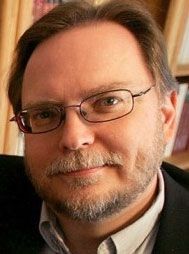 Why is it essential for the Christian to truly “know” Jesus as the “Christ”?  Why is a relationship with Jesus Christ paramount for the spiritual life?  What is it be an authentic disciple of Christ?  These questions are just a few that are answered by master apologist and president of Ignatius Press, Mark Brumley as we discuss the phenomenal book by Cardinal Christoph Schoenborn,  the Archbishop of Vienna. Class A catechesis and rich source of spiritual reading, not only for Catholics, but for the entire Body of Christ.  Highly Recommended!
Why is it essential for the Christian to truly “know” Jesus as the “Christ”?  Why is a relationship with Jesus Christ paramount for the spiritual life?  What is it be an authentic disciple of Christ?  These questions are just a few that are answered by master apologist and president of Ignatius Press, Mark Brumley as we discuss the phenomenal book by Cardinal Christoph Schoenborn,  the Archbishop of Vienna. Class A catechesis and rich source of spiritual reading, not only for Catholics, but for the entire Body of Christ.  Highly Recommended!
[powerpress]
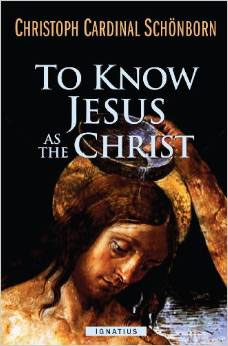 You can find the book here
You can find the book here
From the book description:
An inspiring and practical work by a great churchman about the eternal importance of the Christian faith, and the life and teachings of Jesus Christ, and how it is crucial for our everyday life.
“Catechesis is something different from a theological discourse. Catechesis is actually a way, and we are invited to set out on such a catechetical way. For catechesis is very closely connected with the mission of Jesus himself. It is actually the direct translation of his mission, which he gave to the apostles at the end of his life: ‘All authority in heaven and on earth has been given to me. Go therefore and make disciples of all nations.’ “
Tags: catholic, catholic podcast, catholic prayer, cathollc spirituality
This entry was posted on Tuesday, May 20th, 2014 at 1:36 pm
You can follow any responses to this entry through the RSS 2.0 feed.
Episode 1 – History, with Arms Upraised
[powerpress]
The Resilient Church with Mike Aquilina, offers a fascinating look at the trials and triumphs of the Catholic Church over the past two thousand years. Fast-paced sketches of critical periods in church history give readers perspective on the challenges faced by the church today. Mike Aquilina does not shrink from the realities of the past, including badly behaved leaders and those who betrayed the Lord. Yet he also leaves us all with well-founded hope for the future: God remains faithful in every circumstance and fulfills his promise to remain with his church always.
 Pick up a copy of Mke’s book. You’ll find so much more and invaluable references and resoources, as well
Pick up a copy of Mke’s book. You’ll find so much more and invaluable references and resoources, as well
Also visit Mike’s “Discerning Hearts†page for more audio downloads and information!
Tags: catholic, catholic podcast, catholic prayer, cathollc spirituality, church history, mike aquilina, Resilient Church
This entry was posted on Thursday, May 15th, 2014 at 9:19 am
You can follow any responses to this entry through the RSS 2.0 feed.
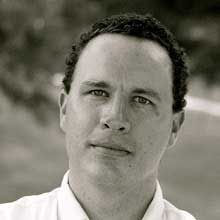 In “The Protestant’s Dilemma: How the Reformation’s Shocking Consequences Point to the Truth of Catholicism”, author/apologist Devin Rose carefully reflects on various Protestant claims and carries them to their logical conclusion.  By incorporating, at times, his own intellectual journey from Protestantism to Catholicism, he simply presents a strong case for the authority of Catholic Church teaching.  The format of the book is excellent for apologetic study. Addressing the basics of the faith, as well as the particulars of Catholic Social Teaching, he gently, but meticulously offers a sound manual of instruction that should be in the library of every one of us called to the “New Evangelization”.
In “The Protestant’s Dilemma: How the Reformation’s Shocking Consequences Point to the Truth of Catholicism”, author/apologist Devin Rose carefully reflects on various Protestant claims and carries them to their logical conclusion.  By incorporating, at times, his own intellectual journey from Protestantism to Catholicism, he simply presents a strong case for the authority of Catholic Church teaching.  The format of the book is excellent for apologetic study. Addressing the basics of the faith, as well as the particulars of Catholic Social Teaching, he gently, but meticulously offers a sound manual of instruction that should be in the library of every one of us called to the “New Evangelization”.
[powerpress]
You can find the book here
From the book description:
What if Protestantism were true? What if the Reformers really were heroes, the Bible the sole rule of faith, and Christ s Church just an invisible collection of loosely united believers? As an Evangelical, Devin Rose used to believe all of it. Then one day the nagging questions began. He noticed things about Protestant belief and practice that didn t add up. He began following the logic of Protestant claims to places he never expected it to go -leading to conclusions no Christians would ever admit to holding. In The Protestant s Dilemma, Rose examines over thirty of those conclusions, showing with solid evidence, compelling reason, and gentle humor how the major tenets of Protestantism – if honestly pursued to their furthest extent – wind up in dead ends. The only escape? Catholic truth. Rose patiently unpacks each instance, and shows how Catholicism solves the Protestant s dilemma through the witness of Scripture, Christian history, and the authority with which Christ himself undeniably vested his Church. The Protestant s Dilemma is the perfect book for non-Catholics trying to work through their own nagging doubts, or for Catholics looking for a fresh way to deepen their understanding of the Faith
Tags: catholic, catholic podcast, catholic prayer
This entry was posted on Monday, March 31st, 2014 at 6:32 am
You can follow any responses to this entry through the RSS 2.0 feed.
Fr. Maciej Zieba, OP offers tremendous insight and a wonderful resource in understanding the heart of Catholic 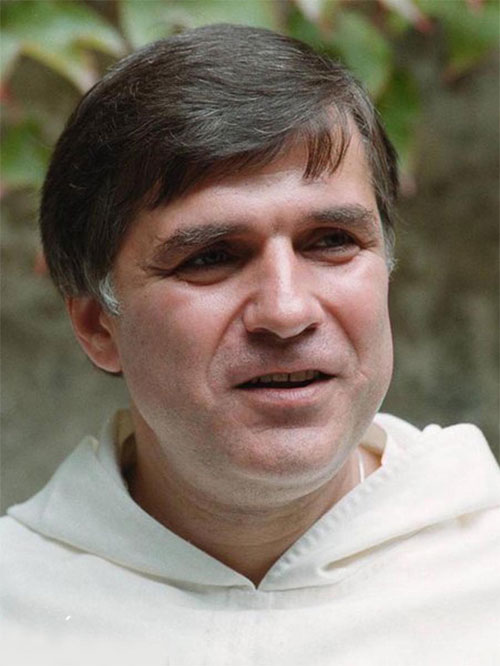 Social Teaching in regards to democratic capitalism.  In Papal Economics: The Catholic Church on Democratic Capitalism, from Rerum Novarum to Caritas in Veritate, he gives an overview the key social encyclicals  from Leo XIII’s Rerum Novarum (1891), through John Paul II’s Centesimus Annus a century later, and finally to Benedict XVI’s Caritas in Veritate (2009). While demonstrating the continuity among the popes,  this work also reveals that the Church’s teaching has evolved in certain key respects—particularly in its judgment on socialism.  Fr. Zieba, a close associate of Pope John Paul II.  He was a key player in the Polish Solidarity movement and is the director of the European Solidarity Center and the founder of the Tertio Millennio Institute in Poland.
Social Teaching in regards to democratic capitalism.  In Papal Economics: The Catholic Church on Democratic Capitalism, from Rerum Novarum to Caritas in Veritate, he gives an overview the key social encyclicals  from Leo XIII’s Rerum Novarum (1891), through John Paul II’s Centesimus Annus a century later, and finally to Benedict XVI’s Caritas in Veritate (2009). While demonstrating the continuity among the popes,  this work also reveals that the Church’s teaching has evolved in certain key respects—particularly in its judgment on socialism.  Fr. Zieba, a close associate of Pope John Paul II.  He was a key player in the Polish Solidarity movement and is the director of the European Solidarity Center and the founder of the Tertio Millennio Institute in Poland.
[powerpress]
You can find the book here
“For a long time to come, this book may well be the definitive work on the economic teaching of the modern popes.” —Michael Novak
“Powerful . . . Should move the Catholic discussion of twenty-first-century economics beyond the familiar refrains†—George Weigel
Tags: catholic social teaching, Maciej Zieba, Rerum Novarum
This entry was posted on Sunday, January 26th, 2014 at 12:09 am
You can follow any responses to this entry through the RSS 2.0 feed.
Terry Barber is a pioneer in the New Evangelization.  He is the founder of Saint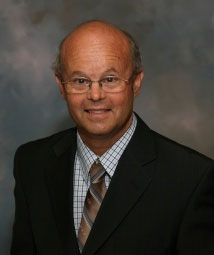 Joseph Communications, Inc., Lighthouse Catholic Media and is a co-host for Reasons for Faith Live with Jesse Romero on EWTN Radio Network. His book, “How to Share Your Faith with Anyone: A Practical Manual of Catholic Evangelization”, is an ideal resource for anyone who desires to share the Good News and become an effective evangelist for Christ.  Immensely practical, Terry’s work is an important addition to the apologetic lexicon.  Our conversation was a joy for me to be a part of.  It’s easy to see why Terry Barber is so great at what he does; his joy, found in his faith, is infectious and grace-filled.
Joseph Communications, Inc., Lighthouse Catholic Media and is a co-host for Reasons for Faith Live with Jesse Romero on EWTN Radio Network. His book, “How to Share Your Faith with Anyone: A Practical Manual of Catholic Evangelization”, is an ideal resource for anyone who desires to share the Good News and become an effective evangelist for Christ.  Immensely practical, Terry’s work is an important addition to the apologetic lexicon.  Our conversation was a joy for me to be a part of.  It’s easy to see why Terry Barber is so great at what he does; his joy, found in his faith, is infectious and grace-filled.
[powerpress]
You can find the book here
“Before it was fashionable to talk about the New Evangelization, Terry Barber was already doing it. His book is a practical manual written from decades in the trenches. After laying the foundation for what evangelism is and why Catholics need to evangelize, the veteran evangelist gives practical training and application to the troops. Soldiers of Christ, grab this book, arise and share your faith!” —Steve Ray. Host, The Footprints of God film series
“Terry Barber has long been one of the Church’s finest evangelists. His excellent book shows us how the new evangelization requires new apologetics – a new way to explain why the Church’s teachings are true and why Jesus is the answer to the deep desires of the human heart.” —Most Reverend Jose Gomez, Archbishop of Los Angeles
Tags: catholic, catholic podcast, catholic prayer
This entry was posted on Thursday, January 23rd, 2014 at 12:00 pm
You can follow any responses to this entry through the RSS 2.0 feed.
 “Roman Pilgrimage: The Station Churches” is a stunning work.  A must have for those who love beauty, the heritage of the Catholic faith, and the celebration and depth of the Church’s liturgy.  The lives of the saints and martyrs come alive in this work which features the spiritual reflections of theologian George Weigel, the exquisite artistic insights of art historian Elizabeth Lev, and the beautiful photography of Stephen Weigel.  George opens with the history of the practice of visiting the tombs of Christian martyrs  which began in the 4th century.  No one tells a story quite like he does. The pilgrimage would eventually evolve into a journey to churches, basilicas, and cathedrals throughout the city of the Saints.  Through this work, in a very real way,  the gift of Rome comes to meet in your home.  The spiritual contemplations are not only ideal for Lenten devotion, but are excellent for any time of the year.  A gift to give to yourself and to anyone you may care about who is traveling the pilgrimage of faith.
“Roman Pilgrimage: The Station Churches” is a stunning work.  A must have for those who love beauty, the heritage of the Catholic faith, and the celebration and depth of the Church’s liturgy.  The lives of the saints and martyrs come alive in this work which features the spiritual reflections of theologian George Weigel, the exquisite artistic insights of art historian Elizabeth Lev, and the beautiful photography of Stephen Weigel.  George opens with the history of the practice of visiting the tombs of Christian martyrs  which began in the 4th century.  No one tells a story quite like he does. The pilgrimage would eventually evolve into a journey to churches, basilicas, and cathedrals throughout the city of the Saints.  Through this work, in a very real way,  the gift of Rome comes to meet in your home.  The spiritual contemplations are not only ideal for Lenten devotion, but are excellent for any time of the year.  A gift to give to yourself and to anyone you may care about who is traveling the pilgrimage of faith.
[powerpress]
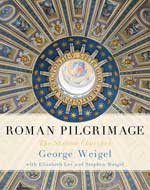 You can find the book here
You can find the book here
Fr. Robert Barron, Rector-President, Mundelein Seminary
“An astonishingly good book. George Weigel’s meditations on the liturgical texts of Lent and Easter are intellectually rich, spiritually alert, and rendered in beautifully crafted prose; Elizabeth Lev’s examinations of the station churches themselves are always informative, insightful, and witty. Equally impressive are Stephen Weigel’s artfully composed photographs. Roman Pilgrimage will delight your eye and feed your soul.â€
Timothy Cardinal Dolan, Archbishop of New York
“On cold, damp, late-winter early mornings, hundreds of priests, seminarians, sisters, and devoted lay people walk the Roman cobblestones to one of the Eternal City’s forty most venerable sites, the station church of that Lenten day. It’s a microcosm of the pilgrim Church and of life’s journey, and Easter is never brighter than after faithfully completing this sixteen-century-old pilgrimage tradition.â€
Tags: Mundelein Seminary, New York, Timothy Cardinal Dolan, work
This entry was posted on Friday, November 8th, 2013 at 3:24 pm
You can follow any responses to this entry through the RSS 2.0 feed.
“Good Pope, Bad Pope: Their Lives, Our Lesson” is another terrific book by the prolific Mike Aquilina.  This is a much needed  resource for all Catholics.  Those of us who love and appreciate the gift of the Papacy in the life of the Church, if we are honest with ourselves, cringe a bit inside when the facts of history uncover those Popes who were…well…bad.  Leave it to Mike Aquilina to guide us through those notorious lives and times, while helping  us to see the lesson we can learn from those particular experiences.  Mike also lifts up those outstanding men who were more than just “good” Popes (which the overwhelming majority were), but reminds of  popes like Bl. John Paul II,  who could be called “great”.  Be not afraid of history, especially when its in the hands of Mike Aquilina.
resource for all Catholics.  Those of us who love and appreciate the gift of the Papacy in the life of the Church, if we are honest with ourselves, cringe a bit inside when the facts of history uncover those Popes who were…well…bad.  Leave it to Mike Aquilina to guide us through those notorious lives and times, while helping  us to see the lesson we can learn from those particular experiences.  Mike also lifts up those outstanding men who were more than just “good” Popes (which the overwhelming majority were), but reminds of  popes like Bl. John Paul II,  who could be called “great”.  Be not afraid of history, especially when its in the hands of Mike Aquilina.
[powerpress]
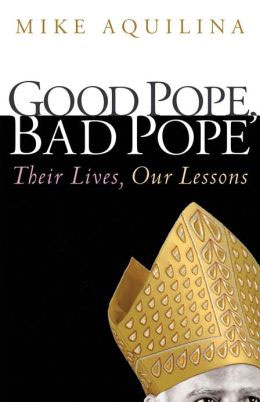 You can find the book here
You can find the book here
From the description:
Every pope is by definition a remarkable man. But the popes whose stories you’ll read here were chosen because they reveal how the papacy developed. They show us how Christ kept his promise to his bride, the Church, not only in her health but also in her sickness. The great popes advanced our understanding of Christian doctrine. But even more remarkable, the worst popes could do nothing to damage the teaching of the Church.
That’s why, even in its darkest moments, the story of the papacy is a story of triumph. And that’s why it’s worth knowing these twelve popes.
Tags: catholic, catholic podcast, catholic prayer
This entry was posted on Wednesday, October 9th, 2013 at 9:26 am
You can follow any responses to this entry through the RSS 2.0 feed.
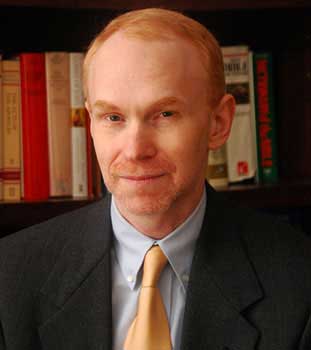 It was great to discuss with Dr. Matthew Bunson the interviews given by Pope Francis to America Magazine and La Republicca .  We discuss the poor translations, issues which have arisen from some of the “statements”, and  the reaction of Catholics to this new “genre” of papal reporting.  Dr. Bunson is a master of seeing through the fog to the heart of the matter.  Great insights!!!
It was great to discuss with Dr. Matthew Bunson the interviews given by Pope Francis to America Magazine and La Republicca .  We discuss the poor translations, issues which have arisen from some of the “statements”, and  the reaction of Catholics to this new “genre” of papal reporting.  Dr. Bunson is a master of seeing through the fog to the heart of the matter.  Great insights!!!
[powerpress]
You can find the book here
For the outstanding article from the OSV Newsweekly authored by Dr. Bunson:
Interview reveals discerning, transparent pontiff
Looking past sensational headlines, it gives insights into his ideas for governance, plans for reform
By Matthew Bunson – OSV Newsweekly, 10/6/2013
The interview was conducted by editor-in-chief of Jesuit journal La Civiltà Cattolica, Jesuit Father Antonio Spadaro. CNS photo The flurry of misinterpretation in the secular media following the Sept. 19 publication of a 12,000-word interview with Pope Francis in America magazineand other Jesuit journals around the world was hardly surprising. Conducted over the course of three sessions in August with Jesuit Father Antonio Spadaro, editor-in-chief of La Civiltà Cattolica, the Italian Jesuit journal, the interview sparked eye-grabbing headlines that painted a false narrative that the pope was somehow declaring the Church’s teachings on abortion, homosexuality and sexual ethics to be no longer relevant.
Incidentally, Pope Francis’ remarks the next day to a group of obstetricians and gynecologists, in which he strongly spoke out against an anti-life culture, threw the secular media for a loop.
A further effect of the brief sensation resulting from the interview, though, was the unfortunate overshadowing of the rest of the deeply personal, transparent and all-around remarkable conversation.
Ideas of government
The wide-ranging questions prompted some profound insights by the pope and also uncovered further aspects of his personality and his formation as a priest and one of the most intensely pastoral pontiffs in living memory. (more…)
Tags: discernment, pope, Pope Francis, Roman Curia
This entry was posted on Saturday, October 5th, 2013 at 4:40 pm
You can follow any responses to this entry through the RSS 2.0 feed.

